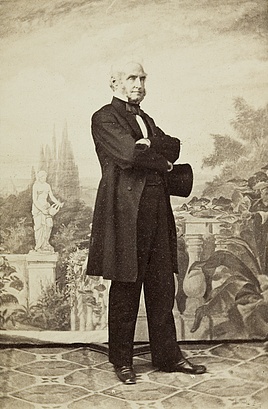By Christopher Phillips, University of Cincinnati
Biographical Information:
- Date of birth: November 29, 1798
- Place of birth: Winchester, Virginia
- Claim to fame: Missouri Secretary of State, 1824-1825; Chief Justice of the Missouri Supreme Court (Whig), 1846-1855; Provisional Governor of Missouri (Republican), 1861-1864
- Political affiliations: Whig Party, Republican Party
- Date of death: January 31, 1864
- Place of death: Jefferson City, Missouri
- Cause of death: Pneumonia
- Final resting place: Bellefontaine Cemetery, St. Louis, Missouri
Hamilton Rowen Gamble, Missouri’s provisional governor, was born on November 29, 1798, in Winchester, Virginia. After graduating from Hampden-Sidney College, he practiced law in Virginia and Tennessee before moving to Missouri in 1818. After settling initially in Franklin, he relocated to St. Louis, where he practiced law and lived for the next four decades. As a moderate proslavery Whig, he served one term in the Missouri legislature and in 1851 was appointed to the state’s Supreme Court, where he served for four years. He dissented in the decision of Dred Scott v. Emerson (the case preceding Dred Scott v. Sanford in the U.S. Supreme Court), maintaining that the slave, Scott, was free because his master had held him illegally as a slave while residing in a free state.
He emerged as one of the leading Unionists in the delegation and played a strong hand in the 98-1 vote to remain in the Union.
In poor health by 1855, Gamble resigned his seat and in 1858 relocated briefly to Pennsylvania. In 1861, Gamble returned to Missouri to win election to the state convention that considered the state’s secession. He emerged as one of the leading Unionists in the delegation and played a strong hand in the 98-1 vote to remain in the Union, making Missouri the sole state to call a secession convention and vote against it. He chaired the convention’s Committee on Federal Relations that drafted the report officially rejecting secession while upholding the state’s stance for armed neutrality.
When the elected governor and clandestine secessionist Claiborne Fox Jackson and pro-secession legislators were driven from Jefferson City by a federal foray under Nathaniel Lyon, the reconstituted convention declared the governor’s seat vacant and on August 1, 1861, chose Gamble as the state’s provisional governor.
As a wartime governor, Gamble found himself and his government caught between pressures of loyalty and disloyalty, national and state authority, military and civil imperatives, and unionist factions in his home state. He opposed harsh, indiscriminate treatment of civilians by Union troops in the state and protested to Abraham Lincoln after department commander John C. Frémont issued an emancipation proclamation for Missouri slaves in late August 1861 (more than a year before Lincoln issued his own emancipation proclamation for slaves in seceded states, and more than three years before Missouri’s slaves officially won their freedom). The president rescinded this aspect of the proclamation and removed Frémont from command.
Fearing its very survival, Gamble’s convention government implemented a stringent “test oath” that disfranchised an estimated 75,000 Democratic voters, including disloyalists as well as neutralists.
Emancipation grew as a central issue of Gamble’s wartime management, largely because of strong opposition in the state legislature by pro-emancipation “Radical Republicans,” led by St. Louis’s B. Gratz Brown and Charles D. Drake. They targeted Gamble for coddling traitors, thus contributing to the escalating violence in their state, charging that Gamble was secretly in league with secessionists. Conservative Unionist supporters fought back by claiming the Radicals were threatening the stability of the provisional government. Fearing its very survival, Gamble’s convention government implemented a stringent “test oath” that disfranchised an estimated 75,000 Democratic voters, including disloyalists as well as neutralists.
Facing the 1862 fall elections and a Radical Union Party strengthened by the state’s debilitating guerrilla war, Gamble grudgingly urged slaveholders to compromise by supporting Lincoln’s gradual, compensated emancipation plan, which Congress approved but largely did not implement, and requested that the general assembly fashion legislation accordingly. The fall election, which by its provisional government’s decision did not include the state offices, was a clear victory for the Radicals. Believing that the balance of power was shifting, he capitulated to the emancipationists by taking a plan of gradual emancipation to a special convention session he convened in June 1863. Approved on July 1, 1863, the legislation stated that Missouri’s slaves would begin to receive freedom, beginning in 1876.
Gamble would not live to see universal emancipation in Missouri, which would come in 1865, or even the end of the war. In December 1863, already in ill health, he suffered a devastating arm injury while riding on a train. In a weakened state, he died from pneumonia on January 31, 1864.
Suggested Reading:
Boman, Dennis K. Lincoln's Resolute Unionist: Hamilton Gamble, Dred Scott Dissenter and Missouri's Civil War Governor. Baton Rouge: Louisiana University Press, 2006.
Parrish, William E. Turbulent Partnership: Missouri and the Union, 1861-1865. Columbia: The University of Missouri Press, 1963.
Cite This Page:
Phillips, Christopher. "Gamble, Hamilton R." Civil War on the Western Border: The Missouri-Kansas Conflict, 1854-1865. The Kansas City Public Library. Accessed Friday, April 19, 2024 - 14:39 at https://civilwaronthewesternborder.org/encyclopedia/gamble-hamilton-r


